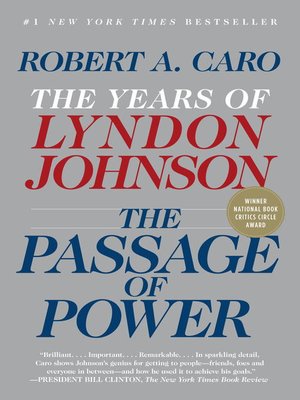


ROBERT CARO: Well, with Jack Kennedy, there was always this sort of, I would say, wary respect. What was his relationship with Jack Kennedy and the Kennedy group, the Kennedy clan, after that campaign? He sought his party's presidential nomination in 1960, lost it to John Kennedy. And in your third volume, you write about how he had mastered the legislative process. Senate, one of the most powerful men in the country. In 1960, Lyndon Johnson was the majority leader of the U.S. "The Passage Of Power" won the National Book Award and the National Book Critics Circle Award.ĭAVIES: Robert Caro, welcome to FRESH AIR.

Robert Caro is a two-time Pulitzer Prize winner. John Kennedy, Caro argued, simply wouldn't have been able to do what Johnson did to advance social justice and economic equality in America. It included Johnson's vice presidency, his sudden ascension to the White House after the Kennedy assassination and Johnson's remarkable success in the first few months of his administration to get historic civil rights legislation through Congress.

I first spoke to Robert Caro in 2013 about his fourth volume, "The Passage Of Power," covering the years 1958 to 1964. Caro also described a Johnson who, as a young man, worked long hours teaching poor Mexican American children in South Texas and who believed passionately in government's obligation to help people. In the earlier volumes, Caro gave us some memorable images from Johnson's life - growing up poor in the Texas Hill Country, blackmailing a fellow student to win a college election and as a congressman, humiliating loyal aides for the fun of it, as well as brazenly stealing votes to get into the Senate. And for the last several years, he's been working on the fifth and final planned volume of this biography, which will cover the years during the Vietnam War. On this President's Day, we'll listen back to two interviews I've recorded with Caro. Robert Caro has made much of his life's work chronicling the career and life of Lyndon Johnson.


 0 kommentar(er)
0 kommentar(er)
